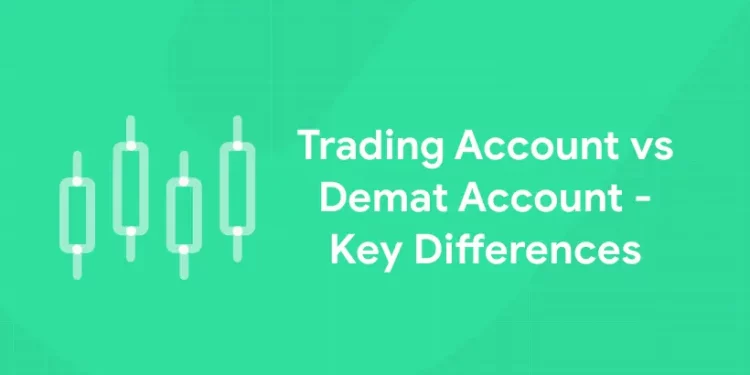Table of Contents
You may have heard of two accounts if you’re considering trading stocks. To invest in the stock market, you must have both a trading account and a Demat account. Though both of these accounts are necessary, they operate differently. You can begin investing in the stock market more successfully if you are aware of their distinctions. Read on to learn more about Trading Account vs Demat Account.
Join to attend the best online course for learning stock market trading!
Trading Account vs Demat Account: Introduction
If you wish to invest in the stock market, there are a few fundamentals you should know. A demat account and a trading account are two of the most crucial prerequisites for stock market trading. The terms “trading account” and “demat account” are frequently used synonymously by investors. While they are interrelated, they provide unique functions. Despite the importance of these two accounts, many people do not understand them. So let us read further to clearly understand the differences between a Trading Account vs Demat Account.
If you want to learn further about all these basics of the stock market and trading, it is better to join an online course that starts from the beginner’s level of knowledge. Entri is one of the platforms on the internet that helps you to learn stock market fundamentals from scratch. But that doesn’t make it just a beginner-level course. It takes you from basics to practical level knowledge with its comprehensive curriculum and talented teachers. Start investing and increase your income with the help of knowledgeable advisors who have experience in the market. They offer many things live practical trading assistance, exclusive live sessions, live mentor support, course certification, post-market sessions etc.
What is a Demat Account?
1: What is a stock?
Your shares and transactions are stored electronically in a Demat account. Opening a Demat account allows you to dematerialise your shares. Put simply, a Demat account facilitates the electronic conversion of physical shares. It functions in the same manner as a conventional bank account. Investors through registered depository participants request that the depository hold these securities electronically. The depository also offers services for securities transactions.
The National Securities Depository Limited (NSDL) and the Central Depository Services (India) Limited (CDSL) are the two depositories that are currently in operation and are registered with SEBI.
Share certificates used to be the physical representation of shares. Market regulator SEBI took action to transform all physical shares into electronic form when the stock market moved to a digital format. This process is known as dematerialization. The securities are held and correspondingly debited and credited to your Demat account as well. To register a Demat account, you can even have no balance at all. You are not even needed to hold any shares.
What is a Trading Account?
Trading accounts work similarly to bank current accounts. They are mostly used for short-term purchases and sales of assets (stocks, derivatives, and commodities), usually to make capital gains.
This account is best suited for traders who want to profit from price swings and market volatility over short time horizons. Opening a trading account with a depositary participant entitles you to a trading ID that may be used to purchase and sell shares.
Demat accounts and trading accounts function together. This suggests that your Demat account stores the shares you purchase through a trading account. If you want to sell them, you can utilize your trading account. A trading account has a unique number, just like a Demat account.
Join the best stock market online course of the year 2024! Register now!
Trading Account vs Demat Account – Key Differences
The key areas where the two accounts differ are listed below. Refer to them for information on the distinction between a Trading Account vs Demat Account.
Functionality
The purpose of the two accounts is one of their main distinctions. To prevent the physical transfer of shares and bonds, shares are now traded digitally. This eliminates the anxiety associated with storing your physical shares.
The digital storage of financial instruments is facilitated by a Demat account. The procedure is aided by a trading account, which debits the shares from the Demat account and sells them on the open market.
Nature of Account
The nature of the accounts is another important distinction between trading and Demat accounts. The trading account functions in the same way as your bank’s current account. Stated differently, it establishes a connection between your bank account and your Demat account. Thus, it is the location where individuals can obtain information about stock market transactions. In contrast, the Demat account displays the shares and securities that an investor possesses at any given moment.
Demat and Trading Accounts’ Function in IPOs
The initial public offering (IPO) requires investors to have a Demat account to participate. However, those who do not desire to sell their shares may choose not to register a trading account. One can trade futures and options in derivative markets if they have a trading account but do not wish to register a Demat account. Share supply is not necessary in this market.
SEBI’s Approval
Opening a Demat account requires SEBI (Securities and Exchange Board of India) approval. But there’s no such thing as a requirement to open a trading account.
Annual Maintenance Charge
The yearly maintenance fee is an additional distinction between a trading and a Demat account. These are yearly fees in addition to brokerage fees for keeping up the Demat account. As a result, each holder is required to ensure that they always make the annual payment. There aren’t any fees of this kind for trading accounts.
| Learn the Stock Market in your Mother Tongue | |
| Stock Market Course in Malayalam | |
| Stock Market Course in Tamil | |
| Stock Market Course in Kannada |
Number of Identification for the Two Accounts
Every owner of a Demat account has a unique identification number. It is employed to distinguish between several accounts. On the other hand, individuals who own trading accounts are assigned a distinct trading number that they can utilize for trading in stocks.
Help in Opening
While opening a demat account requires a Depository Participant (DP), opening a trading account requires a broker or stockbroker.
Security
While a Demat account offers protection against theft, loss, or damage to physical securities, a trading account offers no guarantee against the loss of securities.
Learn stock trading from mentors who themselves are successful traders!
Trading Account vs Demat Account: Similarities
Despite all the differences listed above, these accounts do have some similarities too. Some of them are listed below.
Connectivity
Demat and trading accounts are linked and utilized jointly for smooth trade and settlement.
Investment Activity Facilitation
When it comes to making investments in the stock market and other financial markets, both accounts are essential.
Digital Format
Physical documentation is not required for either account because they both function in an electronic mode.
Investor Identification
Investors are assigned unique identity numbers through both demat and trading accounts, guaranteeing accurate identification and record-keeping.
Also Read: Average Return on Investment in Stock Market
Participation in Financial Markets
Investors can trade securities, take part in the financial markets, and possibly make money with both types of accounts.
Internet-Based Access
Investors can monitor their investments and place trades from a distance thanks to internet access to their demat and trading accounts.
Investor Protection
To safeguard investors and maintain market integrity, both accounts are subject to regulation by the appropriate authorities.
Keeping Records
Records of assets, transactions, and other pertinent information for investors are kept up to date in both accounts.
Management of Accounts
Investors can use the mobile applications or web platforms that their service providers offer to manage their trading and demat accounts.
Investor Support
To answer questions and address problems, both demat and trading account providers provide customer support services.
Learn practical trading lessons from experienced traders!
Stock Market Training Reviewed & Monitored by SEBI Registered RA
Trusted, concepts to help you grow with confidence. Enroll now and learn to start investing the right way.
Know moreTrading Account vs Demat Account: Conclusion
It is essential for traders and investors who are involved in the stock market to know the distinction between trading and demat accounts. The trading account makes it easier to buy and sell securities, while the demat account keeps them in an electronic format. It is advised to open both accounts to facilitate smooth securities management and active trading. Before investing in the stock market, it is crucial to take into account the fees, functions, and operations associated with these accounts. To ensure continuous servicing, you should open trading and demat accounts with the same broker. Investors can confidently manage their money by taking advantage of the benefits and being aware of the drawbacks of both accounts.
Stock Market Training Reviewed & Monitored by SEBI Registered RA
Trusted, concepts to help you grow with confidence. Enroll now and learn to start investing the right way.
Know moreFrequently Asked Questions
Is it feasible to open a trading account without first opening a demat account, or the other way around?
It is not required of you to open a trading and Demat account. One does not need to have the other. For example, you don’t need a Demat account if you only want to trade futures and options. However, a Demat account will work just fine if you’re applying for an Initial Public Offering (IPO) and plan to delay the delivery of shares. However, you will need a trading account if you want to sell those shares.
However, having a Demat account is required when working with equities delivery trading. Thus, depending on your particular objectives, you may require a trading account, a Demat account, or both.
What aspects need to be taken into account when choosing whether to open a demat account, trading account, or both?
You should take into account various factors, including your investment goals, trading frequency, market accessibility, brokerage fees, and the securities you plan to trade when determining whether to open a trading account, a Demat account, or both.
Can I open a trading or Demat account jointly with a partner?
Indeed. Additionally, a Demat account may have up to three account holders: a primary holder and two joint account holders.
Who would gain the most from just having a trading account?
Having just a trading account is usually most advantageous for technical and derivative traders, particularly if they trade less in the equities section.
Do my trading and demat accounts need to be linked?
Indeed, to ensure smooth transactions, your trading account and demat account must be connected to transfer shares during purchasing and selling activities.
Can I have more than one trading and demat account?
Certainly, based on your investing needs and preferences, you can maintain multiple demat and trading accounts with various brokers or financial institutions.
Who is eligible to apply for trading and demat accounts?
Anyone can apply to open a trading or demat account if they want to invest or execute a trade in the stock market. Individuals, resident Indians, non-resident Indians, Hindu Undivided Families (HUFs), and business entities are typically among them.
Is adding a nominee required when creating a trading or Demat account?
It is necessary to opt in or opt out of nomination in a Demat Account. However, for succession planning purposes, it is always prudent to add a nominee to the trading and demat accounts. This will provide a seamless transfer of assets in the event of unanticipated events. If not, it will be difficult for your heirs and legal agents to obtain your securities.
Is it possible for me to have a trading account without a demat account?
If you want to trade only derivatives, such as futures and options, then you can establish a trading account without a demat account.
Are the Demat account and trading account the same thing? Are trading and demat accounts provided by the same financial company?
No, the Demat and Trading accounts are two distinct accounts with separate features. To invest in the stock market, you need them both. With the former, you can purchase and sell shares, while with the latter, you can keep them in an electronic format.
Yes, as part of an all-inclusive package for stock market trading and investment, the majority of financial institutions offer both demat and trading accounts.










